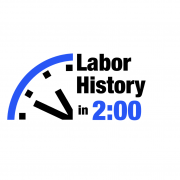On this day in labor history, the year was 1917.
That was the day the Granite Mountain and Speculator Mines in Butte, Montana caught fire, killing 168 miners.
It is considered the worst underground hard-rock mining disaster in the nation’s history.
Just weeks after the United States had entered World War I, the demand for copper had surged.
Granite Mountain, like many of the nation’s mines, operated around the clock to meet war production needs.
In his book, Fire and Brimstone: The North Butte Mining Disaster of 1917, Michael Punke notes the irony of the disaster, which began as an effort to improve safety.
A sprinkler system had just been installed.
The final task was the relocation of an electrical cable.
The cable was insulated with oil-soaked cloth, sheathed in lead.
Workers lost control of the three-ton cable as they lowered it into the mine and it fell to the bottom of the shaft.
Carrying a commonly used carbide-burning lamp, the night shift foreman accidently ignited the cable as he planned its removal.
The conflagration was virtually immediate and burned for more than three days.
At the time, 415 miners were at work on the overnight shift.
Smoke and gases quickly filled both mines.
With no alarm system in place, those that could not escape succumbed to carbon monoxide poisoning.
In 1996, a memorial plaza was dedicated to those who lost their lives.
It details a slice of Butte’s mining and labor history that culminated in tragedy.
The #RickShow is available everywhere. Check your radio dial or your favorite podcast app, and if you want to catch the TV show, find us on:
YouTube: https://bit.ly/3szHAJ6
Free Speech TV: https://freespeech.org
Political Voices Network: https://politicalvoicesnetwork.com
To support the show, visit https://www.thericksmithshow.com or subscribe to our Patreon Page here: https://bit.ly/2Y7tZdP



